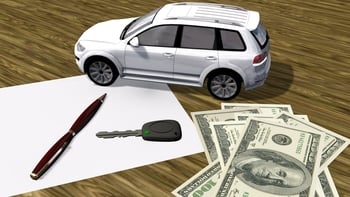 This is the third of nine articles in our Blog Series Is Leasing Really Fleecing?
This is the third of nine articles in our Blog Series Is Leasing Really Fleecing?
Our previous article on Do Leases Include Interest Charges? focused on how the time-value of money factors into the charges that consumers pay during the course of a lease. Many consumers enticed by low monthly payments experience sticker shock at the end of a lease. In this article, we discuss the charges consumers can expect when it comes time to return the car.
Perhaps the biggest practical difference between a lease and a car loan, from a consumer’s perspective, is that the consumer owns the car at the end of a car loan. She can keep it, sell it, trade it, or give it away. And, if there is a coffee stain on the upholstery or a scratch on the fender, the only consequence is the appearance of the car. And, it makes little financial difference whether she has driven 31,000 or 34,000 miles.
It is a quite different story with a lease.
If a consumer wants to keep the car at the end of the lease, she must buy it from the leasing company. The purchase price will be the residual value of the car, which is disclosed on the lease. Sometimes the residual value will be less than the true value of the car. In that case, the consumer might want to exercise the purchase option. An upcoming article will address why exercising the purchase option for a car is often much more expensive than buying it outright.
If the consumer does not purchase the car at the end of the lease, she must return it to the leasing company. Leases typically provide that the consumer must pay the cost to repair any damage that is beyond the “ordinary wear”. The dealership will inspect the car and take notice of any scratches, wear, or damage that are in excess of what would be expected. So, a little wear on pedals would be expected, but a dent on the front bumper is going to result in a significant additional charge. A few scratches and blemishes are considered ordinary wear, but finance companies differ on how much damage to a car’s finish will be acceptable. It is usually a good idea to call the finance company or a dealer to ask for guidance towards the end of a lease. Some minor scratches and blemishes can be resolved by a good detailing. Or, it may save some money to have defects to the finish rep aired before turning in a car.
A consumer will also be charged for any excess mileage. Leases provide the number of miles that a consumer may drive during the course of the lease. Some leases permit as many as 15,000 miles a year, but some permit only 10,000 miles. The consumer is charged for every mile driven in excess of the allowed amount. For example, many 36-month leases permits 12,000 miles a year and charges $0.15 for excess miles. If a consumer drives 45,000 miles over 3 years, which is fairly typical mileage, he will be 9,000 miles over the allowed amount and charged excess mileage fees of $1,350. If, however, another consumer drives only 25,000 miles with the same allowed amount, there will not be any credit to the consumer.
Many consumers are surprised to receive a bill for property taxes long after a leased car has been returned. Because the finance company owns the car, it is responsible for property taxes in many states. Consumers are responsible to reimburse those charges under the lease. In Connecticut, the taxes are based upon whether a vehicle was registered to a consumer on October 1 and, in most municipalities, are due the following July 1. So, the consumer may not get the bill for tax reimbursement until up to ten months after lease termination.
Federal law requires that all end of lease charges be clearly disclosed in the lease agreement. Consumers should read those disclosures carefully so that they full understand what their financial responsibilities may be at the end of the lease. Otherwise, they might be in for a big surprise.
Our next article will discuss some of the Games that Dealers Play in connection with car leases.
